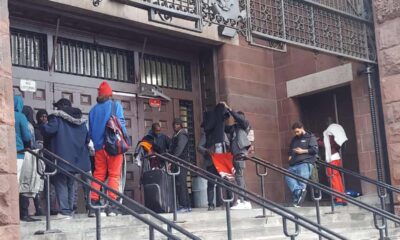At Home
What you Need to Know About Airbnb
WILLIAMS: Not About Property Owners Getting some “Air”
It’s Putting Brakes on law-breaking Developers Profiting Millions from Warehousing, Renting Short-Term Spaces
Yes, we know too well how renting space in an apartment under the AIR BnB initiative helps struggling property owners catch up on bills and equalize untenable fiscal situations, like making college tuition payments on time.
But for some reason, there’s a faux picture of Councilman Jumaane Williams depicting him as an ax-wielding prohibitioner determined to slay all forms of the B ‘n B phenomenon – which is alive and well throughout the five boroughs, including the neighborhoods, he serves:
Let’s be clear: Jumaane Williams is NOT going after people who are following the law, owners of single and two-family homes who are ON SITE – not absentee — if they are renting out an apartment for fewer than 30 days.
Landlords and developers who have constructed their version of a New York City housing project, not designed for the poor, are the ones Williams and other Councilman have an issue with. These big apartment buildings hold spaces for short-term apartment dwellers, and rack up millions in profit. Then there are the tenants who stay somewhere else while renting their apartments through the Air BnB service at above-market rates, earning more than the apartment’s landlord.
The three proposals on the table to regulate Air BnB include:
A law passed in 2010 which makes it illegal for hosts to rent out an apartment for fewer than 30 days unless that host is present. The law does NOT apply to owners of single- and two-family homes. A Council bill would increase the penalty for violating the law from the existing range of $1,600 to $25,000 to between $10,000 and $50,000.
Legislation would require the city buildings department to submit an annual report to the Council on illegal conversions in apartments.
A third Council proposal would remind tenants they don’t have to pay rent if their landlords are violating the law.
What Williams says he wants is for Air BnB to be the good corporate citizen he knows it can be and “clarify the law to its users.” Yesterday, Air BnB said it would comply, but it can’t make it has not satisfied the first step: bringing its data to the table. Councilman Williams also wants Air BnB to not hide behind an aspect of its brand, helping the good guy dream dreams, and focus on the greedy profiteers. (Bernice Elizabeth Green)
NYC Council Proposes Steep Fines against Airbnb Housing Law Violators
By Mary Alice Miller
A proposed NYC Council bill would increase tough fines against host Airbnb users. The fine would raise a first-time offense from $1,000 (which does little to deter property owners who break city and state housing laws) to $10,000 with a maximum penalty of $50,000. Violators could face an additional $2,000 per day for each day the original fine is not paid. A second bill would require regular reporting of the number of complaints, inspections and violations, as well as penalties assessed and collected.
State law regarding short-term rentals makes it illegal for most NYC residents to rent out their home for fewer than 30 days at a time, unless they are present.
In response to the pair of proposed bills, Airbnb (last week) sent a three-page letter to NYC Council member Jumaane Williams, who is chair of the Committee on Housing and Buildings. The letter from Airbnb head of public policy Christopher Lehane called the proposals the “Freddy Krueger of bills.”
Council members Williams and Helen Rosenthal (chair of the Contracts Committee) said that the maximum fine would not be levied against the occasional Airbnb user, but would target landlords who illegally rent out regulated apartments and landlords with bid buildings who empty out half of their building then rent those units out on Airbnb.
“This isn’t about people going on vacation. Any time someone gets caught (illegally renting out their apartment),” said Williams, “it is because they are doing it repeatedly.”
NYS Attorney General Eric Schneiderman issued a report in October 2014 that found a dramatic rise in apartments used as transient hotel rooms via short-term rental platforms like Airbnb.
The report found that most short-term rentals booked in New York violate state and local laws that prohibit certain short-term rentals. During the report’s 4-year review period, 72% of units used as private short-term rentals on Airbnb appeared to violate those laws. The report also found that some commercial Airbnb users operate as illegal hotels that offered up to hundreds of unique units, accounting for 36% of private short-term bookings that generated $168 million. Private short-term rentals displaced long-term housing in thousands of apartments. Numerous short-term rental units appeared to serve as illegal hostels where multiple unrelated guests shared tight quarters. Rapidly gentrifying neighborhoods accounted for the vast majority of revenue from private short-term rentals in NYC.
“We must ensure that, as online marketplaces revolutionize the way we live, laws designed to promote safety and quality of life are not forsaken under the pretext of innovation,” said Schneiderman when the report was released. “The joint city and state enforcement initiative is aimed at aggressively tackling this growing problem, protecting the safety of tourists and safeguarding the quality of life of neighborhood residents.”
Airbnb said in a statement that it has helped “countless” families pay their bills and stay in their homes. The company said it has already removed more than 2,000 of the New York listings that violated state or city laws.
In response to the attorney general’s report, the City Council held a hearing earlier this year on how Airbnb affects housing and the local economy. Another hearing took place this week. A vote on the proposed bills is scheduled at the end of the year.
Apartments used as illegal hotels for 6 or more months a year via Airbnb divert much-needed housing from New Yorkers. The problem is exacerbated when affordable housing that has been subsidized by taxpayer dollars are used as illegal hotels. An additional concern is the possible violation of various building and fire codes that create safety hazards for occupants and their neighbors. Crime is also an issue: Around the world, there have been numerous instances of Airbnb hosts committing crimes against guests, including rape and robbery.
Airbnb places hosts at risk of eviction and the possible loss of a co-op or condo due to breaking the lease.
A study published last summer by New York Communities for Change and Real Affordability for All found 10% of available housing has been lost in the 20 most popular Airbnb neighborhoods in Manhattan, Brooklyn and Long Island City, Queens. The average rental unit was available for 247 days a year and rents 109 nights a year.
A month ago, the Brooklyn Chamber of Commerce partnered with Airbnb to promote local businesses to guests. Brooklyn accounts for one-third of Airbnb guests in New York City.
What Landlords and Tenants of Rent-Stabilized Apartments Need to Know About Airbnb
by Amanda Brown, Associate Attorney, Rozario & Associates
Airbnb is an Internet platform that connects individuals offering accommodations to those seeking to book accommodations. All terms, including price and length of stay, are agreed upon in advance and the transaction is completed online.
As one can imagine, Airbnb has caused quite a stir in New York City, one of the top tourist destinations in the world.
A New York County Civil Court recently evicted a tenant who rented out his rent-stabilized Hell’s Kitchen apartment via Airbnb. In 42nd and 10th Associates, LLC v. Ikezi, Judge Jack Stoller held that it is a violation of the Rent Stabilization Code for tenants to profiteer4 off of their rent-stabilized apartments.
After testimony from various employees of the landlord, the court found that the tenant, Henry Ikezi, was renting out his apartment via Airbnb at a rate three times the regulated rent.
One of the landlord’s witnesses, an employee of the subject premises, testified to meeting one of Ikezi’s guests and to finding an advertisement for Ikezi’s one-bedroom apartment on Airbnb. The advertisement was admitted into evidence.
Another witness, a concierge who is stationed in the lobby of the apartment building five days per week, testified to seeing Ikezi only five times in the four months preceding trial. The concierge also testified to helping another one of Ikezi’s guests who needed assistance with a key.
Ikezi denied remembering any details regarding Airbnb transactions.
The court found that Ikezi’s evasive answers constituted an attempt to withhold information and that Ikezi did not present a defense because, under the circumstances, there was no defense to present.1
Accordingly, the court found that Ikezi engaged in profiteering by renting out his apartment on Airbnb, and that using a residential apartment as a hotel room is an incurable ground for eviction, as it undermines the New York Rent Stabilization Code.
In addition, because such a violation is incurable, the court held that the landlord was not required to serve Ikezi with a notice to cure.
The court cited various cases that held that the commercial exploitation of rent-stabilized apartments is an incurable violation which requires eviction pursuant to the Rent Stabilization Code, and that absolved landlords from serving notices to cure as such violations are incurable.
In a similar decision issued on August 6, 2015, Judge Phyllis Saxe, New York County Civil Court, awarded a final judgment of possession against Tracy Steele, a tenant who rented a three-bedroom apartment in New York City’s West Village.
Steele began subleasing the extra bedrooms in her apartment to guests she found via Airbnb at a rate of $215.00 per night, 2.5 times the rent-stabilized rate.16 Judge Saxe classified the ongoing act as “commercial exploitation, which threatens the integrity of the rent stabilization scheme and deprives the landlord of making the same profits.”
Steele argued that her guests were “temporary roommates” and, as such, the petitioner had no right to terminate her lease.18 However, this argument was of no avail to the court, which found that said guests, who wrote “customer reviews,” were provided fresh linens and food, and were charged a $76.00 cleaning fee, were hotel guests.
In addition to addressing commercial concerns, the court placed an equally strong emphasis on the safety issues that come with “illegal hoteling,” namely, the number of unverified guests who know the building’s access code, the increased risk of injury, theft and fire damage, as well as risking termination of the building owner’s residential insurance policy.
Like Judge Stoller, Judge Saxe found that Steele’s violations of the Rent Stabilization Code were incurable, thus, the landlord was not required to serve tenant with a notice to cure.
While Judge Stoller and Saxe’s opinion unequivocally states the consequences of profiteering from the benefits of rent stabilization, it is important to note what the court did not address. The court did not address situations in which tenants use Airbnb to rent out market-rate apartments, nor did it address rent-stabilized tenants who charge rental rates comparable to their own.
However, Judge Saxe’s discussion regarding building safety should put all tenants on notice that the use of Airbnb to rent out their apartments are potentially violating their lease agreements and the city’s illegal hotel laws, both of which are grounds for eviction.
After Judge Stoller’s ruling, New York State Senator Liz Krueger and New York City Council member Jumaane D. Williams applauded Judge Stoller’s ruling in a joint statement addressing the negative effects that Airbnb has on New York City’s housing market.
Landlords’ opinions are split regarding the use of Airbnb to rent out New York City apartments. Many landlords want nothing to do with the accommodations platform because of the liability that comes with hosting a revolving door of tourists, while others are looking for a way to legally cash in on its popularity.24
Most landlords agree, however, that the legislature must take some action to address the city’s growing “illegal hotel” culture.
Both landlords and tenants of rent-stabilized apartments should be wary of jeopardizing their coveted regulated rental rates by exploiting, or allowing the exploitation of, such rates for personal gain. Landlords who suspect their tenants are in violation of their lease agreements and/or the law should immediately contact an attorney to discuss their options for addressing such violations.
Similarly, tenants seeking to rent out their properties via Airbnb or another platform, as well as those threatened with eviction, should contact an attorney who can advise them of their rights under their lease agreements and vigorously defend their case.
Amanda M. Brown, Esq. is a business attorney with experience handling real estate-related matters, including landlord/tenant, foreclosure defense and real estate closings. She is an associate at Rozario & Associates, P.C., a commercial and business law firm based in Brooklyn, New York. Ms. Brown can be reached at abrown@rozariolaw.com or (718) 859-2325.














